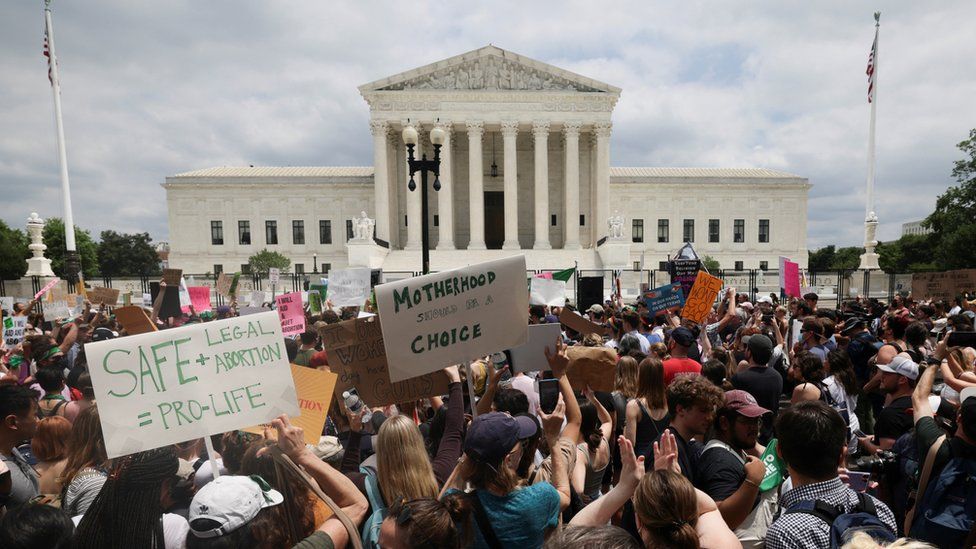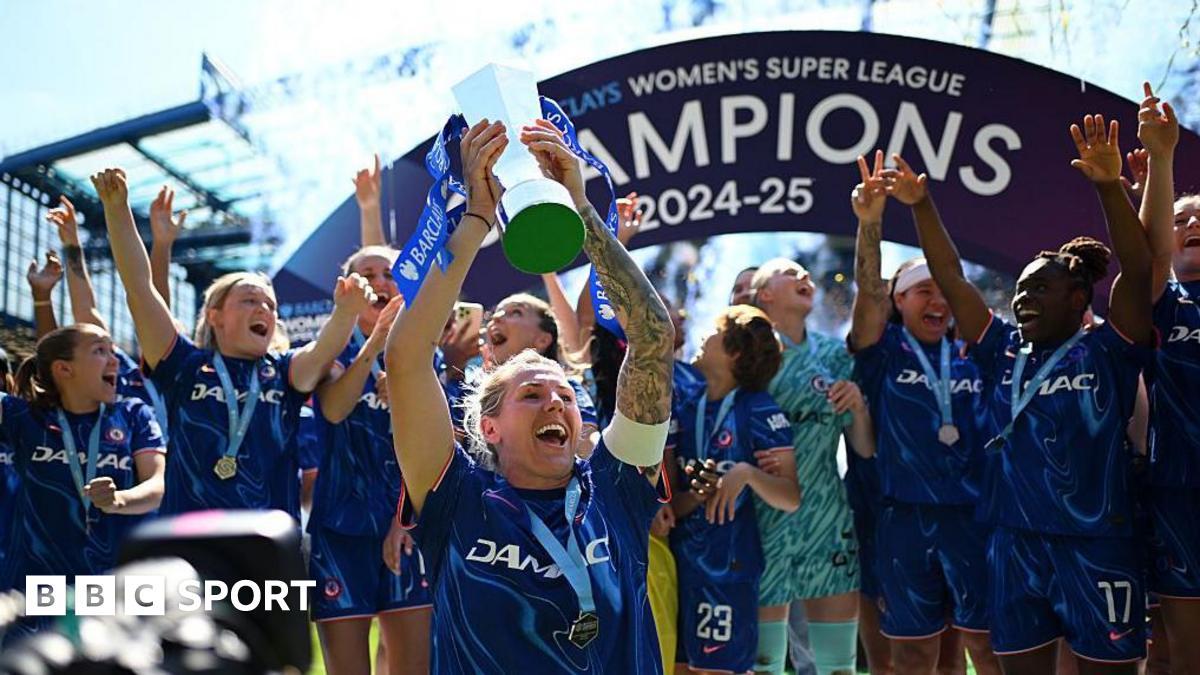ARTICLE AD BOX
By Jonathan Josephs
Business reporter, BBC News
 Image source, Reuters
Image source, Reuters
The US Supreme Court's decision to restrict abortion rights led to big demonstrations and for many companies to object
"Just shut up and make the Oreos."
Daryl Brewster is recounting a discussion about children's nutrition and the safe use of ingredients at a board meeting of the US food giant Nabisco. It was back in 2004 and as president he was trying to make the biscuits, and other products, healthier.
However, one of the directors wanted him to keep the company focused solely on making biscuits, and making money for shareholders. Ultimately changes were made, including the removal of trans fatty acids and the introduction of more transparent labelling.
In the near-two decades since, the nature of business leadership has changed and companies are increasingly speaking out on social and political issues, from nutrition to climate change and diversity.
Just making money is "not the opportunity anymore", says Mr Brewster, who now runs Chief Executives for Corporate Purpose, which helps many of the world's biggest companies craft their messages on these issues.
Image source, CECP
Image caption,Corporate leadership has undergone big changes in the last 20 years, says CECP's Daryl Brewster
"Companies need to think through those issues that are relevant to them... how they're going to respond and maybe even take action before these become major issues.
"Companies realise that to increase profits over time, they need to be good citizens of the world."
Last month's decision by the US Supreme Court to restricts women's rights to abortion led some of the country's biggest companies to speak out against the decision, and offer to pay for their employees to travel to a different state for an abortion.
One of the leading voices in that response was the online business review platform, Yelp.
"Not only did we want to protect and safeguard our own employees by creating a travel reimbursement," explains Yelp's chief diversity officer Miriam Warren, "we also recognise that our employees, our consumers and our customers were looking for us to be vocal on this issue."
Image source, Getty Images
Image caption,American companies are the most vocal on social and political issues, with firms in other countries increasingly speaking out too
Some 61% of US adults say abortion should be legal in all or most cases, while 37% think abortion should be illegal in all or most cases, according to a survey by the Pew Research Center.
"After the reversal of Roe v Wade several weeks ago, we have recognised the need to become even more vocal on this issue. And from that we hear very frequently not only from our employees with notes of gratitude, but also from people around the country and now even the world, on the stance," says Ms Warren.
Yelp, which has more than 244 million reviews of businesses from more than 30 countries, has also spoken out on issues including transgender and LGBTQ+ rights, as well as US gun reforms and free speech.
"Fundamentally we've taken stances on issues that are issues of human rights," says Ms Warren. "[Those affected] are our colleagues, they're our customers, they're our consumers. And if we don't take a stance with the massive platform that we have available to us, it's really an incredibly missed opportunity on a moral level [and] on a social level."
Image source, Yelp
Image caption,Yelp's Miriam Warren thinks history will not look favourably on companies who don't speak up
The idea that companies can positively influence these conversations has public support. Edelman's Trust Barometer surveyed more than 36,000 people in 28 countries and gave business a significantly higher score than either governments or the media on this. Companies came just one point behind non-governmental organisations.
However, 52% of respondents said capitalism as it exists today does more harm than good in the world.
Ms Warren says anecdotal evidence suggests this activism is good for business but that boosting profits at a company that made nearly $40m (£34m) last year is not a motive.
"Many corporate actors are silent and potentially attempting to remain neutral. Frankly, I think neutrality is not going to be looked on favourably, particularly from a historic-looking lens."
However, even if a company wants to be vocal on a particular issue, it might not always be wise to do so.
"Sometimes it's best just to say absolutely nothing, you cannot win," says Paul Argenti, who is professor of corporate communications at Dartmouth University in the US.
As a consultant to major companies, including Wall Street bank Goldman Sachs and Japanese conglomerate Mitsui, he has developed a framework for working out when and why companies should speak up.
The first thing he asks is: "Is this connected in some way to the overall strategy, the business or the core context of what they do?"
He goes on: "The second thing that I look for is: can you actually do something about this incident or this issue?
"And then the last piece of it is how are your constituencies going to respond? Will most be positive about your decision, or will a significant and important constituent weigh in against you that might cause you more harm than good?"
It helps a company to have a positive impact when these tests are met or when its leaders feel passionately about an issue. An example, according to Prof Argenti, is Apple chief executive Tim Cook's commitment to tackling climate change, when in 2014 he told investors who didn't agree to sell their shares. "That is a very, very bold move by a company."
Image source, Getty Images
Image caption,Apple boss Tim Cook has been outspoken in his belief that businesses must help tackle climate change
In contrast Prof Argenti says one of the worst moves a company can make is to change its stance on an issue when coming under pressure. Disney recently lost its special tax status in Florida, something which is thought to have saved it tens of millions of dollars over the years, after speaking out against the state's "Don't Say Gay" legislation. It had initially said nothing but was persuaded to intervene by employees.
Last month Unilever made a deal to continue selling Ben & Jerry's ice cream in the occupied West Bank despite the ice cream brand itself saying doing so was "inconsistent" with its values, because of Israel's control of the area.
There was disagreement between shareholders, with Norway's biggest pension fund, KLP Asset Management, among those against the deal, saying Unilever was "putting profits over human rights".
Unilever said it was a "complex and sensitive matter" and it has never supported a boycott of the territory.
Image source, AFP
Image caption,Ben & Jerry's was unhappy with parent company Unilever's decision to keep selling ice cream in the occupied West Bank
While shareholders may disagree with a company's decision or stance on a particular matter, even if they can't get them to change it, they can still wield influence.
This year a group of investors, led by Netherlands-based Achmea Investment Management, failed in their efforts to force some of the world's biggest Covid vaccine makers to increase access by giving away their know-how.
However, they do regard an increase in support for their plan as positive progress and a "strong message towards management". Their pressure led to one of the three, Moderna, to link executive bonuses to vaccine distribution.
CECP's Daryl Brewster expects companies to speak out more on social and political issues in a world that is becoming increasingly politically divided.
"Business has an opportunity, if not to find common ground, but to find a higher ground that society can move towards.
"Things like climate change and social justice are really critical issues where I think business can play a leading role in partnership with other businesses, in partnership with governments as well.
"But I think there is a void that we've seen in so many places, and businesses which are really serving the vast majority of our population really do have an opportunity and a need to really kind of step in on those key topics."
For more on this story, watch Talking Business on BBC iPlayer (available to UK viewers only).

 2 years ago
82
2 years ago
82








 English (US) ·
English (US) ·